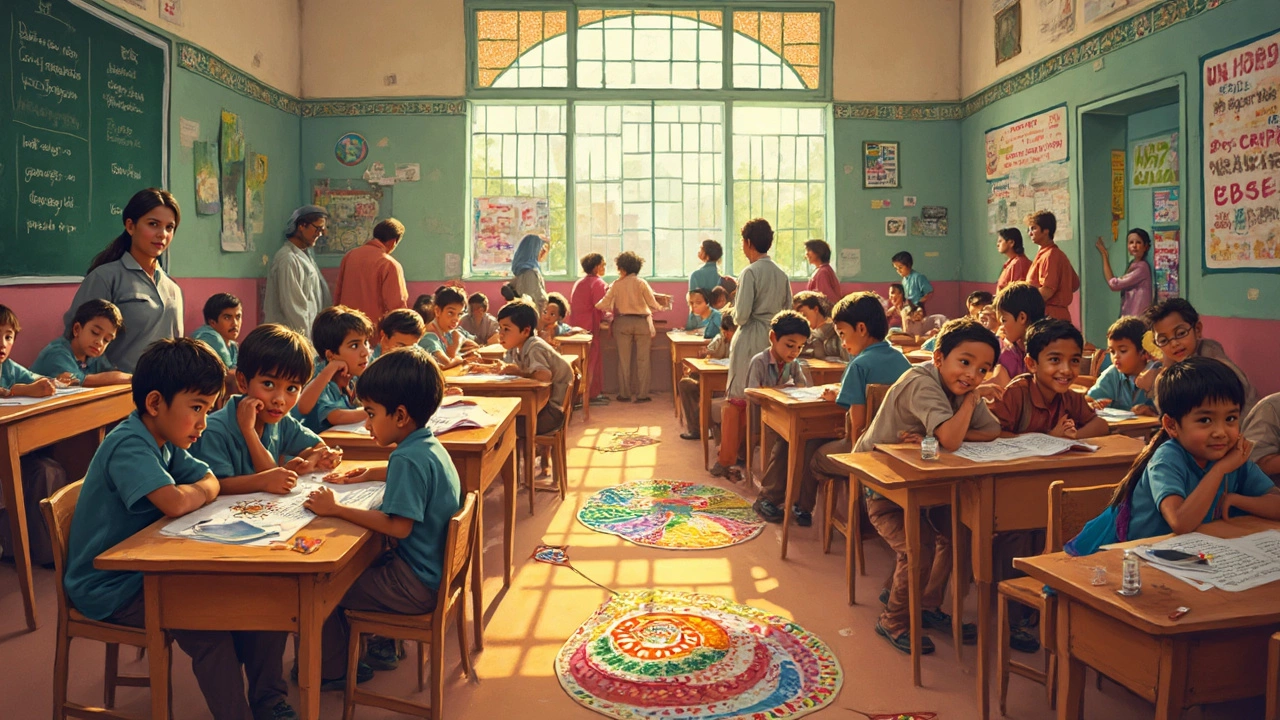If you've ever wondered why Delhi has its own set of CBSE papers, you're not alone. It's a question that many students and parents across India have been asking. So, let's dig into what's behind this decision. Seriously, how did this all start?
Delhi's CBSE board recently decided to set unique exam papers for its students. The primary reason? Tailoring the educational experience to address specific needs and challenges faced by the students in Delhi. This isn't just a random change; there are solid reasons for it.
The capital city has its unique educational landscape, influenced by diverse demographics, resource availability, and the pace at which the student population is growing. The board claims that by customizing the exam papers, they can better assess and cater to these distinct requirements.
- The Surprising Move to Separate Papers
- Understanding CBSE's Decision
- Potential Impacts on Delhi Students
- Key Differences in the New Papers
- How Students Can Adapt to the Change
The Surprising Move to Separate Papers
So, why did Delhi get its own set of CBSE papers? This decision wasn't made on a whim. It all started when educators noticed that Delhi's diverse student population faced unique challenges that required a tailored evaluation method.
The city experiences high student concentration with more than 2,500 CBSE affiliated schools. This dense network means that students often face stiff competition, not just locally but in a national context too. The idea here was to level the playing field, giving Delhi students a paper that suits their pace and learning environment.
The Background
Back in 2023, a study highlighted that Delhi students exhibited different stress levels and exam patterns. It brought to light that a uniform paper across the country might not be the best option. The Central Board reacted with this move to implement a distinct set of CBSE papers for the capital.
Exam Pattern Changes
You might wonder how different these papers really are. The crux lies in their design. These papers focus on skill-based questions rather than rote memorization, adjusting the evaluation to meet specific educational demands. For instance, some sections might require deeper logical reasoning, while others may focus more on creative solutions.
The Reaction
Parents and students had mixed reactions. Some welcomed this change as a breath of fresh air, hoping it would truly enhance students' abilities and address systemic issues. Others were worried about the sudden shift and its implications on competitive exams where national uniformity is crucial.
Despite the initial concerns, the idea is to offer a fair chance and a relevant educational experience for all parties involved, aiming at not just academic success but holistic growth.
Understanding CBSE's Decision
So, why exactly did the CBSE decide to have a separate set of papers just for Delhi? Let's break it down. The CBSE, which stands for the Central Board of Secondary Education, believes that education isn't a one-size-fits-all deal. With students in Delhi facing different challenges and opportunities compared to other regions, the board felt it necessary to adapt.
Addressing Diverse Needs
Delhi's student population is incredibly diverse. Think about it: the city draws people from every corner of the country, each bringing their own educational background and needs. By creating specific exam papers, the CBSE aims to level the playing field, ensuring fair assessment aligned with what's taught in the classroom. Tailor-made exams are all about closing the gap between theory and practice.
Reducing Burden on Students
Let's be real, exams can be stressful. The new exam format recognizes this and tries to alleviate some of that pressure. By drafting questions that are more relevant to the Delhi curriculum, students could find themselves better prepared and less stressed.
Safety and Fairness
There's also a practical side to this change. With reports of paper leaks being a concern in the past, issuing different papers in Delhi helps secure the process. It's a way of ensuring that every student has an equal shot at scoring well, free from the unfair advantage of leaked questions.
For spec heads wondering about stats, check this out:
| Year | Incidents of Paper Leaks |
|---|---|
| 2022 | 5 |
| 2021 | 7 |
While these changes might seem like a big deal now, they could represent a shift towards more sustainable and personalized education approaches. And who knows? Maybe this model will spread to other areas in the future.

Potential Impacts on Delhi Students
So, what does it mean for students in Delhi to have separate CBSE papers? One major impact is how it changes the way they prepare for exams. With distinct papers designed specifically for the needs of Delhi students, there’s a shift in the focus and style of questions they might encounter.
For some students, this could be a big advantage, as the exam format might be better suited to their learning styles. Since Delhi has such a diverse student population, the idea is to give everyone a fair shot by addressing their unique challenges. This could lead to improved confidence and better results.
Adapting to the New Papers
Students will need to adjust their study habits. With changes in the question patterns, there might be a stronger emphasis on different topics or skills compared to previous years. It means staying updated on curriculum changes and possibly adapting study materials accordingly.
Teachers in Delhi are also adapting their lesson plans to ensure that they're hitting the right points, which is crucial for students to perform well. Engaging with teachers more, asking how these changes affect day-to-day learning, and seeking advice can make the transition smoother for students.
Peer Pressure and Family Expectations
Another aspect to consider is the potential increase in pressure from peers and family. The whole 'different exam' situation might come with its own stressors like keeping up with a new study pace or feeling isolated from peers in other states who don't face the same changes.
| Aspect | Impact |
|---|---|
| Exam Focus | Tailored for Delhi's needs |
| Study Techniques | Updated strategies needed |
| Teacher Support | Crucial for transition |
By recognizing the possible hurdles and preparing for them, students and parents can tackle these changes head-on. After all, the intention behind unique Delhi CBSE papers is to create a fairer, more effective educational experience. Students just need to stay proactive and embrace the transition to make it work in their favor.
Key Differences in the New Papers
So, what's really changing with Delhi's special CBSE papers? For starters, these unique papers aim to align more closely with the curriculum pace and teaching style prevalent in Delhi's schools.
Focus on Localized Content
One noticeable shift is the inclusion of more region-specific topics. It means that certain questions might draw from local history or issues relevant to the Delhi region.
More Application-Based Questions
Another significant tweak is the emphasis on application over rote learning. These papers are geared towards testing a student’s ability to apply concepts rather than just recall information. It's rather interesting given how often paper patterns rely heavily on memorization.
Varied Difficulty Levels
A stratified approach is also part of the new design. The structure embraces varied difficulty levels to accommodate diverse student skills, aiming to challenge high-achievers while ensuring all students can attempt the full paper.
Innovative Question Formats
Here's something cool—they've introduced innovative formats like case studies and problem-solving scenarios, which is a shift from the typical question styles.
Data and Stats
According to an internal survey, about 60% of educators in Delhi believe these papers could improve critical thinking skills.
| Feature | Benefit |
|---|---|
| Localized Content | Improves relevance and engagement |
| Application-Based Questions | Encourages practical use of knowledge |
| Varied Difficulty | Caters to diverse students |
Overall, these Delhi CBSE papers are more about thinking and less about cramming facts. But remember, all these changes are still aligned with the core CBSE syllabus, so don't set your textbook aside just yet!

How Students Can Adapt to the Change
So, Delhi students are facing unique CBSE papers now. It may feel like an extra hurdle, but with some smart strategies, you can tackle it head-on. Here are some tips to get you started.
Understand the Syllabus
First things first, know your syllabus inside out. Since Delhi papers have shifted, the syllabus might emphasize different areas compared to the rest of India. Check with your teachers or school's website to get the latest updates on what to focus on.
Access Past Papers
Give yourself a real advantage by practicing with past Delhi-specific CBSE papers. They're like a sneak peek into what to expect. They’ll not only give you a feel for the format but also highlight the commonly tested topics.
Create a Study Plan
No, seriously. A decent study plan is a lifesaver. Break down your topics into daily goals. This way, the changes in the CBSE syllabus won't seem overwhelming. Stick to your schedule and tweak it if necessary—life happens, after all!
Use Online Resources
The internet can be your best study buddy. There’s a ton of online resources tailored for Delhi’s new CBSE papers. Platforms like Khan Academy and Byju's offer video tutorials and practice exercises. Use these to reinforce what you’ve learned.
Group Study Sessions
Studying with friends can actually be productive. Grab a small group of classmates and quiz each other on the changed focus areas. Sometimes a buddy can explain a tricky concept better than a textbook.
Communicate with Teachers
If something isn't clear, don’t wait. Get in touch with your teachers. They are in the loop with the latest updates on these separate papers and can guide you through any confusion. Plus, they might have secret tips up their sleeves!
Adapting to these Delhi CBSE papers might seem daunting at first. But with these tools and strategies, you’re more than capable of turning this into just another stepping stone on your academic journey.

